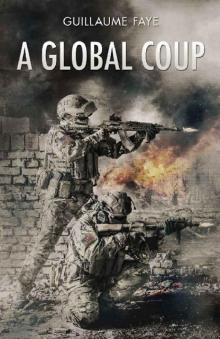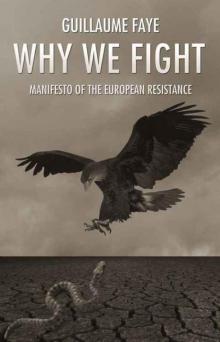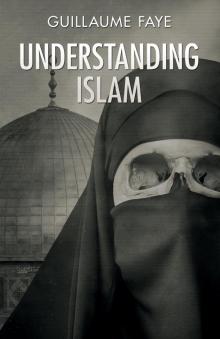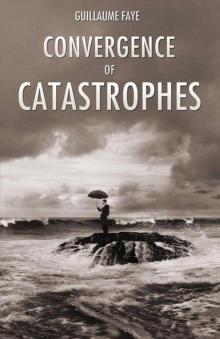A Global Coup, page 31




What we urgently need is a powerful interventionist policy, for we are now entering a unipolar world that we Americans ought to love and exploit to our advantage. Whenever our cause is just and our interests threatened, we must act unilaterally, whatever the consequences. (‘Bless our Pax Americana’, The Washington Post, 22/03/1991.)
One can hardly be any more cynical and caricatural. As we can see, the neo-imperialist ideology was already in place at the start of the 1990s. Thanks to a bizarre turn of events, the 9/11 terrorist attacks provided it with the necessary implementation tools.
***
American ‘democratic imperialism’ was also theorised in the 1980s by Michael Novak, whose ideas have equally inspired recent American governments. He argues that the US must implement Christian morals (meaning ‘God’s intent’, basically) on a global scale; this should be done tangibly and politically, and in full compliance with the Protestant doctrine, thus applying a sort of democracy that Christ Himself is said to have wanted and whose sword is allegedly embodied by the USA itself (and yet, nowhere in the New testament can one encounter any praise of ‘democracy’). Basing his standpoints on the Augustinian and Aristotelian tradition, Ryn responds by stating that man is not subject to perfectibility and that the Heavens must not be equated with the Earth. Nor must there be any effort to establish Paradise in this world or mix politics with religion. In no way is the USA the hand of God, he says. In Europe, one can only be left in awe in the face of such theological-political debates, which only rage in the US and nowhere else. Let us, however, not forget that America has, since its very beginnings, been marked by the merger of politics and theology. Ryn, a Catholic who could be considered Carl Schmitt’s American counterpart, has always struggled against the application of Protestant religiousness to the field of politics, because it replaces reason with passion, just as Islam does. This premise has been confirmed by the ‘Axis of Evil’, an expression coined by David Frum, who drafts G. W. Bush’s speeches.
Ryn also points out that the neoconservatives have taken the idea that the USA is the sole promoter of global freedom to its utmost extreme. Such a notion had already been formulated by American President Woodrow Wilson back in 1919, before being reiterated by general George C. Marshall, but it was not as extreme at the time. Here is what Bush had to say about it:
Why are some people angry at us? Why do some want to wage war against our country? The answer is: because we love freedom. Exactly. And because they hate it. (West Point, 01/06/2002.)
The neo-Jacobins claim that those who oppose the US are the enemies of ‘freedom’ and that pre-emptive war is necessary against them. Such was the very precise ideology embraced by French Montagnard13 revolutionaries in 1793. Confusing the cause of global freedom with American geostrategic interests, Bush did not hesitate to declare in the above-mentioned speech: ’The American flag will not only stand for our power, but for freedom’. However, many of Bush’s American opponents remark that ‘freedom’ and ‘democracy’ enjoy less respect in their own country than among other Western nations.
***
The day after the 9/11 attacks, Robert Kagan, one of the chief ideologists behind the NAI, published an article in the Washington Post entitled ‘We Must Fight this War’, in which he demands a brutal response; not through anti-terrorist actions conducted by American secret services, but through spectacular military strikes. His plea would not fall on deaf ears. Kagan demanded that Congress declare war against every nation involved in terrorism. Here is his grandiloquent proclamation:
The situation requires that America act with moral clarity and our fathers’ courage in the face of the Pearl Harbor aggression. There is no point in wasting time, wondering what we have done to incur the wrath of such inhuman murderers. There is no point for us to seek to understand their motivations, or attempt to reason with and appease those who have spilled our blood.
On the same day, William Bennett, Jack Kemp and Jeane Kirkpatrick, all of whom are also neoconservative ideologists, issued a communiqué that was broadcasted everywhere, in which they called for ‘a war against the entire Islamic terrorist network’.
Ryn highlights the fact that Bush Junior, who began his presidential mandate by promising a greater degree of ‘humility’ in the American foreign policy, is concluding it with
… the greatest thrust of American involvement into global affairs and the American state’s historically strongest intrusion into the lives of its citizens.
In his view, the neoconservatives, these ‘democratist’ neo-Jacobins (who are not ‘democratic’ at all, in fact), have manipulated Bush the simpleton and, taking advantage of the 9/11 attacks, paved the way for a global policy that aspires to establish an empire. Alongside Charles Krauthammer, these influential ideologists also comprise Midge Decter, who, while advocating ‘democracy’, of course, and calling for its global establishment, asked Bush to ‘cleanse the world’ of all that is undemocratic (in Peace through Democracy, The Washington Post, 28/06/2002).
***
Bush understood the message perfectly. On September the 15th 2002, he sent the American Congress the traditional report on America’s foreign strategy known as the ‘National Security Strategy’. This text is of a capital importance because it officially defines the NAI as the ‘government’s doctrine’. In it, Bush explained that he had relinquished his former vision of a ‘humble’ American foreign policy and indulged in an exposé centred around the new American imperialistic agenda, which had obviously been dictated by its ideologists. I shall now cover its most remarkable aspects. The struggle against ‘terror’ was naturally presented as the essential axis of America’s new policy, but naively defined as a means to support ‘America’s extremely ambitious global role’. Having already set his sights on the Iraqi campaign, he asked for the authorisation to conduct a pre-emptive attack against Iraq. He then engaged in the undisguised advocacy of an ‘armed American hegemony over the world’, a longing that had never been previously expressed in such terms by any other American President. This prosody was obviously justified, in harmony with the very essence of the neoconservative ideology, through the necessity of globally defending and promoting the 4 interconnected principles of democracy, freedom, American security and free trade.
According to the Washington Post, this text, presented by the White House itself, was something unheard of, ‘bestowing upon the US an almost messianic role’. It ventured even further than the manifesto that had been published by the neocons a few years earlier (and to which Wolfowitz, America’s deputy Defence Minister, had greatly contributed) on the topic of an ‘American 21st century’. This report-agenda preached an armed form of American activism and specified in a most straightforward manner that
America’s global power and influence are unprecedented and unequalled. […] Sustained by its faith in the principles of freedom and the values of an open society, the USA has unparalleled responsibilities and obligations, but also opportunities to seize beyond its own borders.
Moralism meets cynicism…
The White House report affirms one of the NAI’s foundations:
[T]o have overwhelming military power in order to discourage any other power from defying us, contesting American hegemony or possessing weapons of mass destruction.
One is left speechless before the naivety of such assertions, proclaimed officially and publicly. As if pure military power could ever guarantee domination… It would be a futile endeavour to search the entire history of German and Japanese militarism for such warmongering emphasis, which sounds ridiculously caricatural, just like General Alcazar’s rhetoric.14
The report also confirms that the new imperialist strategic doctrine has desisted the former concepts of deterrence and containment once used against America’s foes or potential threats, all in favour of direct military intervention. It is in this very text that the latter is defined and legitimised by the White House, taking the shape of ‘pre-emptive and unilateral attacks against potentially menacing states or organisation’, even in the absence of any direct aggression against the US or its allies. Mere suspicion suffices (as witnessed in the case of Iraq), and, as seen in the report, the USA has freed itself from all UN regulations and international laws that only authorise strictly defensive wars. One could say that it is ‘the Law of Suspects’ that prevails, just as it once did during the French Revolution, which, once again, confirms Ryn’s view regarding the American ‘neo-Jacobins’.
It is absolutely incredible that the famed ‘international community’ failed to react to this official doctrinal document at the time of its publishing. And yet, a study conducted by the Washington Post (21/09/2002) gave a clear explanation of the White House’s new strategy: ‘Bush Shifts Strategy from Deterrence to Dominance’. It is obvious that those who oppose the NAI, including William Pfaff (the above-mentioned editorialist at the International Herald Tribune), consider this new strategic doctrine to be foolish and liable to spread global insecurity.
The last words of this fundamental report, which allows us to fully comprehend the essence of the NAI, are the following:
This American strategy can be described as an American internationalism that differs from all others and reflects the unity of our national values and interests.
There is, however, nothing new about this ‘internationalism’: Soviet communists could equally have written this exact final sentence.
Although Ryn contests this doctrine, he does think that it has the merit of being clear, unlike the strategic vagueness that characterised previous American Presidents, except for Nixon, who was an anti-imperialist (which, incidentally, cost him his position). The neocons’ aim is for the US to
… establish a global supremacy through which it could impose itself as the world’s sole arbitrator of good and evil and reserve itself the right to unilaterally respond and implement its judgements using force.
In short, America would act simultaneously as a procurator, a judge and a police force. Kenneth Alderman, a Defence advisor for the White House, candidly explained in the Washington Post (always the same Leftist daily paper, ever open to the neoconservative quill) that the Europeans who advocated ‘multilateralism’ had failed to understand the facts and ‘should thank America for waging the war of civilisation against barbary for them’. And why not indeed? The only problem is that, considering the manner in which America is fighting this battle, ‘barbary’ has some great days ahead of it.
***
Here is the final judgement passed by both Richard C. Holbrooke (Clinton’s former ambassador to the UN) and Ryn on the conservatives’ belligerent biblical messianism. Let us, however, first recall the words spoken by Bush himself during an interview with Bob Woodward (published in the Washington Post on September the 19th 2003):
There exists a value system which we will make no compromise on, and this value system is the one we preach. And if these values are good for our people, they must be good for all others.
As good Americans, Holbrooke and Ryn are not that offended by the messianism pervading this foreign policy, this merger between America and God’s will on Earth. They look upon this propensity with a certain leniency, as the latter mirrors, after all, the ‘Christian Right’ ’s age-old proclivity and traditional American tendency to consider America the world’s archangel of morals and goodness. What they severely condemn, on the other hand, is the triumphalism that permeates the New American Imperialism, an imperialism, which, in their eyes, exploits the Christian spirit in favour of sheer warmongering. Ryn thus adopts the Catholic and Christic doctrine of rendering unto Caesar what belongs to Caesar and unto God what belongs to God. He accuses the neoconservatives’ fanatically evangelical and Protestant neo-imperialism, which allows itself, for instance, to remodel the Near-East ‘in order to help the Chosen People of Israel’, of espousing a missionary mentality that is completely out of place, thus behaving in a neo-Jacobin manner.
This position is an interesting one, and was also adopted by the (catholic) archbishop of Boston, who, in May 2003, sent Bush a threatening and very harsh letter in which he denied him the right to label himself a Christian. Furthermore, Ryn highlights the absurd notion of ‘global democracy’ preached by the neo-Jacobins, whose ‘homogeneity and virtuality’ do not correspond to the traditions of any single people and which has thus no hope of ever coming to pass.
One could chastise Ryn and all the other Americans who criticise neo-imperialism for remaining, at heart, attached to America’s messianic and biblical ideals (even if they do not really acknowledge this) and for not having grasped the fact the G. W. Bush is but the immoderate extension of such standards. Their criticisms are, however, more credible than those used by European intellectuals who have been stricken with OHAA.
***
To round things off, here is a passage taken from Ryn’s above-mentioned essay, which embodies one the best critiques targeting the NAI or what the author has baptised ‘neo-Jacobinism’. Its tone remains pessimistic throughout.
The neo-Jacobins are attempting to remove any obstacles to the triumph of their ideology and will to power. They exhibit a revolutionary 15 mental disposition that will inexorably lead to disaster. Alongside what President Bush has termed “the anonymous tombs of the lies forgotten by history” [in his speech to the American Congress on September the 20th 2001] expands the historical cemetery of those who have been drugged by their own dogmatic certitudes, those men whose moralism conceals, even from their own eyes, their unavowed hunger for power. As Ronald Reagan once warned, utopian idealists and all ideologies paved with good intentions are responsible for the worst ailments that the world endures. Persuading oneself that one is always the defender of good renders one blind to their own sins. […] The most generous and most charitable state of mind leads here to inevitable political-religious imperialism. Every observer that is attentive to philosophy and history must remember the terrible and large-scale suffering that sanctions or results from one moral or intellectual Jacobinic concept or another. Communism, one of the most radical and pernicious manifestations of the Jacobin spirit, has disintegrated, at least as a major political force. But there is another global utopia, one that claims universality, which is now taking the latter’s place, coming from the USA itself. The neo-Jacobin vision, which claims to know how to redeem humanity, may of course seem less utopian than that of communism. But the essence and spirit of both movements is one and the same and, whether one likes it or not, utopian thinking remains everywhere identical, admittedly almost inoffensive when limited to isolated dreamers and theoreticians, but suddenly dangerous the moment it begins to inspire those who, through politics, act upon the real world. […] The qualities of prudence, realism, a sense of compromise, and self-restriction, which are all indispensable in politics, have been swept aside, as has the capacity to control the eruptions of collective passion and extremism. The crusaders of the Bush administration are causing the ancient American virtues to disappear. The constantly growing neo-Jacobin power could take on the shape of disaster. By acting under its influence, American leaders may well set fateful consequences into motion, tragic sequences which neither they nor their successors will be able to control.
***
The Americans who criticise the NAI often emphasise the idea that their country’s imperial vision is doomed to fail, because it is based on economic profit above all else.
American historian Hunt Tooley, who teaches at Austin College and is the author of ‘The Hindenburg Program of 1916: A Central Experiment in Wartime Planning’, has deemed the American neo-imperialistic military strategy to be completely inappropriate and out of touch with our world’s realities. On September the 18th 2003, he published an article on the Ludwig von Mises Institute website (Auburn, Alabama) entitled ‘The Bipartisan War Machine’, in which he predicted the disastrous failure of Iraqi adventurism. In his view, the ‘neoconservative clique’ is taking the ‘imperial fantasy’ to ridiculous extremes, even though it does not have exclusive monopoly over the latter. Clinton had already implemented ‘imperial conquest and domestic repression’, a recurrent combination in American history. All Bush is now doing is resuming and accentuating the policy adopted during the first Gulf War and the bombardment of Serbia. Tooley denounces the hypocrisy of the Democratic opposition to the war in Iraq, an opposition that actually partakes in this imperialism: indeed, they would have condoned this military operation if it had taken place within the UN’s framework, in addition to not having protested against the first Gulf War, the 10-year bombardment of Iraq or the intervention in Serbia. Nowadays, their anti-imperialist posturing is only motivated by the ‘coalition’ ’s stalemate in the Middle-East, Tooley explains.
He adopts Claes Ryn’s analysis regarding American ‘neo-Jacobinism’, which has based its militarism on the legitimacy of expanding democracy and freedom, the demonisation of all opponents and a ‘crusade conducted for the sake of mankind’. In his eyes, the real objective is to militarily occupy each targeted country by establishing a puppet government there, so as to ‘rebuild’ it and appropriate its resources in a manner that profits the corporations that neoconservative leaders are involved in and not the ‘American people’, which these neoconservatives are entirely indifferent to. Tooley’s central assertion is that, unlike European imperialisms (and especially the German one, in which Tooley is a renowned historical expert), American imperialism does not serve the interests of the ‘nation’ (nor those of some expansive form of nationalism), but rather those of companies and financial institutions whose sales agents are none other than government members and politicians.
In order to mobilise the American public opinion, nationalism and patriotic pride are used as promotional slogans (propaganda) rather than motivations, and moral legitimations are not always sincere.
The persistence of this mental structure is absolute and is achieved through the alternation between Democrats and Republicans, allowing the latter to move from a belligerent crusader posture to one of rational pacifism, in accordance with electoral needs and the electorate’s levels of emotionality and self-blame.



















